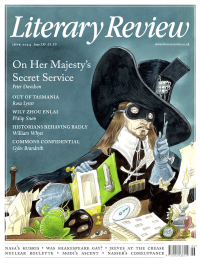R J B Bosworth
Goodbye, Mussolini
Italy Reborn: From Fascism to Democracy
By Mark Gilbert
Allen Lane 544pp £35
Three interwar European regimes, the governments of Nazi Germany, Fascist Italy and the USSR, have been damned as ‘totalitarian’. The word originated in Italy, where it was first applied to Benito Mussolini’s regime by the patriotic anti-Fascist Giovanni Amendola. It was then adopted by the Fascists as a description of their purpose, encompassing the idea that everything must be for the state, nothing outside the state and nothing and no one against the state. Italy’s remained the only government that adopted the term. After 1945, political scientists applied it zealously to Nazism and Stalinism. Italy tended to fade from their story, leaving the nature of the Italian dictatorship to be contended by historians of that country.
When it came to emerging from ‘totalitarian’ tyranny into ‘democracy’, however defined, most will agree that Germany has earned an A+ and Russia an F. But what of Italy? This is the important question that Mark Gilbert addresses in his solid account of the early days of the Italian Republic, first established through a referendum held on 2 June 1946. As we learn in Gilbert’s preface, those assessing Italy’s political performance since the war have often been stern about its idiosyncrasies: the threat to order posed by left- and right-wing terrorists after 1968, the election of populists like Silvio Berlusconi and the rule in our own day of Giorgia Meloni, leader of a party, the Fratelli d’Italia, that has its roots in neo-Fascism. In contrast to Paul Ginsborg and many other analysts of Italy’s recurrent ‘turbulence’, Gilbert urges his readers to concentrate on the big picture: ‘The house of Italy’s democracy must and would have crumbled during the upheaval of the past three decades, had it not been built on solid foundations,’ he advises. Its best point of comparison is indeed West Germany. Maybe Italy deserves its own A+.
In arguing this case, Gilbert sets some limits. He focuses on Italy’s political history up to 1953, when the country held its third full-scale democratic election. From late 1945 onwards, the Christian Democrat (and anti-Fascist) Alcide De Gasperi (1881–1954) was prime minister. Gilbert tells us he was a canny and

Sign Up to our newsletter
Receive free articles, highlights from the archive, news, details of prizes, and much more.@Lit_Review
Follow Literary Review on Twitter
Twitter Feed
Under its longest-serving editor, Graydon Carter, Vanity Fair was that rare thing – a New York society magazine that published serious journalism.
@PeterPeteryork looks at what Carter got right.
Peter York - Deluxe Editions
Peter York: Deluxe Editions - When the Going Was Good: An Editor’s Adventures During the Last Golden Age of Magazines by Graydon Carter
literaryreview.co.uk
Henry James returned to America in 1904 with three objectives: to see his brother William, to deliver a series of lectures on Balzac, and to gather material for a pair of books about modern America.
Peter Rose follows James out west.
Peter Rose - The Restless Analyst
Peter Rose: The Restless Analyst - Henry James Comes Home: Rediscovering America in the Gilded Age by Peter Brooks...
literaryreview.co.uk
Vladimir Putin served his apprenticeship in the KGB toward the end of the Cold War, a period during which Western societies were infiltrated by so-called 'illegals'.
Piers Brendon examines how the culture of Soviet spycraft shaped his thinking.
Piers Brendon - Tinker, Tailor, Sleeper, Troll
Piers Brendon: Tinker, Tailor, Sleeper, Troll - The Illegals: Russia’s Most Audacious Spies and the Plot to Infiltrate the West by Shaun Walker
literaryreview.co.uk